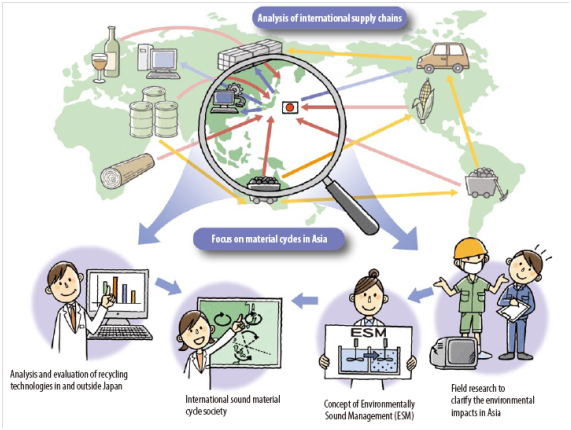The center has many successful records of industrial ecology related research such as material flow analysis (MFA) and life cycle assessment (LCA), which makes CMW the leading research center in the area of industrial ecology in Japan.
Current studies related to industrial ecology are:
(1) MFA,
(2) Input-output analysis and LCA,
(3) Metals, and
(4) E-waste
MFA
Economy-wide MFA is a central pillar of our studies on industrial ecology. The outcomes and insights gained from the study have contributed to policies adopted by the Ministry of Environment of Japan, especially relating to the ‘Fundamental Plan for a Sound Material-Cycle Society’ in which three material flow targets of national policy were put forward. Not only economy-wide MFA but also MFA for products such as electrical and electronic equipment and automobiles are the strength of our research. For instance, we published a database of lifespan, LiVES (Lifespan database for Vehicles, Equipment, and Structures), the first in the world as far as we know. We also account for the total material requirements of the Japanese economy.
Input-output analysis and LCA
An input-output analysis (IOA) is a powerful tool in industrial ecology to understand quantitatively how production and consumption activities in a nation directly and indirectly relate to environmental impacts and natural resource consumption. Our current efforts in IOA are directed to methodological development for identifying the interrelationship between Japanese economy and global resource flows, and its applications to energy, metal and biomass resources. Furthermore, we provide a Japanese LCA database based on IOA, 3EID (Embodied Energy and Emission Intensity Data), which is widely used for various calculations of carbon footprint in Japan.
Metals
For sustainable and cyclical use of metals, we evaluated the distribution tendency of elements in major remelting processes to examine the controllability of impurities in the pyrometallurgical technique thermodynamically. The results may give answers to the frequently asked questions: ‘Which impurity elements are removable in metallurgical processes?’ and ‘How far can impurity levels be controlled?’
E-waste
In order to extract hazardous substances and to recycle valuable materials in e-waste, e-waste should be managed properly at all stages of generation, transportation, dismantling, recycling and final disposal. We are estimating the amount of e-waste generated, and domestic and international flows. A number of our field surveys in Asian countries have elucidated issues in recycling processes of e-waste and associated environmental degradation. Based on this knowledge, we are trying to propose environmentally sound management of e-waste in the Asian region.
Research Project 1: Appropriate management of materials with hazards
and resource potential in harmony with international material cycles
Tomohiro Tasaki, Keisuke Nansai, Kenichi Nakajima, Atsushi Terazono, and Rieko Kubota

No comments:
Post a Comment